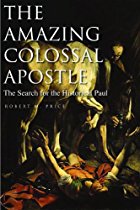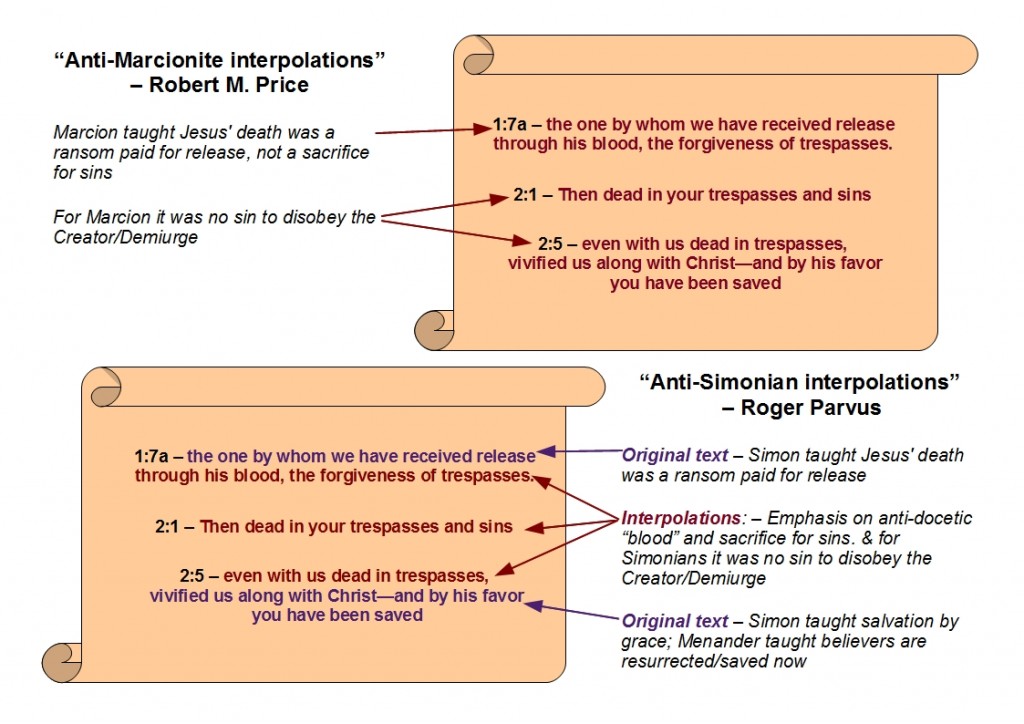What a shameful week this has been. Three bloggers, Tom, Dick and Larry, have gone out of their way to heap personal attacks on Joseph Atwill, ostensibly in order to distance themselves from his views. What’s worse is that two of those bloggers have regularly censured the biblical studies and theology establishments for resorting to personal insults upon those who attempt to make a case for the Christ Myth theory — “intellectual bullying”, “verbal intimidation”, “unprofessional”, “shameful”, are said to describe this proclivity.
Clearly the abusive personal insults they have flung at Joe Atwill indicate these bloggers have no interest in winning over anyone sympathetic to Joe. So why do they do it? I can imagine two possible reasons:
- They want to prove to the establishment of respectable scholarly elites that they should not be associated with the ideas of Joe Atwill. That is, they kick Joe to be assured of the approval of those they personally want to impress or from whom they personally want respect; or/and
- They are desperate to bully or intimidate a wider audience from even being tempted to give serious consideration to the views of Joe Atwill.
None of this personal abuse is necessary. It only makes the perpetrators look as sick as the academic hypocrites they criticize for spewing the same types of ad homina against them.
This is comes with the free-speech we enjoy, but the original idea behind the ideal of free speech was that the best or truest ideas would eventually rise to the top as everyone had an opportunity to hear the arguments for and against them all. Our innate reasonableness would lead to the most reasonable ideas winning out in the end. But we can now see that Tom, Dick and Larry are just as prone to resorting to intellectual intimidation as those they criticize. Intellectual bullying was not the way a free speech society was meant to work.
But what if someone really is bonkers?
I think the Atlantis theory is bonkers. But if I were addressing someone who believed it I would not insult them by saying they were bonkers. If I felt it worth the effort I would argue the case just as soundly as I would expect an evolutionary biologist or palaeontologist to argue against Creationism with a fundamentalist. In fact, it was indeed because I discovered that someone I considered a friend did believe in the Atlantis myth (and a few other oddities besides) that I did take the time to do a bit of homework and make a serious effort to present a reasoned and evidence-based case against those ideas. One of them I eventually posted here. I don’t believe any of that effort was wasted. What would have been wasted would have been any energy expended in calling my friend a crackpot.
There is a place for certain kinds of language and expression. I do not speak at work planning meetings the same way or with the same language I use after work with friends over a few beers. I do not write policy or information sharing documents for work in the same language I use when expressing personal work frustrations with a trusted colleague. We have evolved to be social beings and we need to refine and maximize our social skills to the utmost if we want to achieve the best possible outcomes in the wider social context.
Now I think a number of readers here know I do not agree with the views of Acharya S. (D.M. Murdock). I have attempted to argue against her views and those of Robert Tulip on this blog. At no time did I utter a personal insult against either. Nor did I provocatively call their views “cow scat”. I did attempt to strictly address specific claims, words used, arguments made — and for my pains I was slandered like nobody’s business on the discussion forum of Acharya S. One does not argue against her or her followers in public and get away with it. I soon lost interest in continuing to argue my reasons for rejecting her thesis. I guess I let her win. She proved that personal insult and abuse can silence critics. Maybe I should continue.
There is much more to be said here (and yes, those in positions of power and responsibility should be held to higher standards than others), but I’ll save a more detailed discussion of the state of much of academia for another post.
Back to these “Let’s kick Joe Atwill” types.
Tom’s scatalogical critique
The first of these personal attacks came from Tom. He calls Atwill’s documentary (“what you are watching”) “golden cow scat”. He critiques the entire film before he has seen it (he only concedes that Joe Atwill has “apparently” made a documentary film) entirely from the blurb itself. Any blurb is, by definition, an attempt to persuade you to read or view the contents by suggesting they are something new and different. The blurb is not the argument itself. But that doesn’t stop Tom from writing an entire critique of what he calls the blurb.
If you are planning to go see this movie, please, bring a disposable bag so you can properly rid yourself of the dung that undoubtedly will be thrown at you during the presentation.
Now that’s a profound intellectual argument!
The personal character and mind-reading attacks continue:
Atwill clearly has no grasp of these concepts, probably because he didn’t bother reading anything related to this despite his self-acclaimed ‘bookish-ness’.
Like all sensationalist crap-dealers, Mr. Atwill claims to have discovered the secret, super-dooper, hidden code in the text. Amazing! I (sic) self-proclaimed “Biblical scholar”, with nor formal training in the material, has used his magic decoder ring and stumbled upon a code! How clever of him.
In the Dead Sea Scrolls, which Mr. Atwill seems to think he knows so well. . .
It is just so beyond absurd. It really is.
Here is the thing. It may be that Mr. Atwill is completely clueless about this. Maybe he isn’t just trying to scam everyone and sell a bunch of books to a group of gullible people. Maybe he legitimately hasn’t read anything relevant on this subject or any recent scholarship on it.
And then we glimpse that shameful Freudian slip beneath the skirt. Joe Atwill’s real sin is that he is “not one of us establishment intellectual elites!” He is an outsider! Shock, horror, ultimate scandal — he even uses the “Popular Media”! If anyone takes him instead of us seriously they are nothing but a gullible, ignorant rabble. Whoever takes us seriously is wise and virtuous! You can tell the difference between us. We have the power to kick him and keep him locked outside behind the gates of character attacks and personal insults.
[Atwill is] not using ‘Greco-Roman’ correctly. [Don’t explain to the popular reader why Atwill’s use is incorrect. That only adds to the aura of intellectual superiority of the critical reviewer.]
He makes claims but doesn’t seem to realize how ridiculous they actually are; it is that scholars find his work “outlandish”. . . . I mean it is still crazy talk. . . [DO scholars really find “his work” outlandish? Tom finds the blurb to his documentary film outlandish. Have any scholars actually read his “work” and critiqued it? Or do they just scoff at the conclusions because they are so incompatible with anything they have studied.]
Steven Mason, a real scholar, . . . .
The difference between what these scholars have written and what Mr Atwill have (sic) written is threefold:
(a) all of them have academic training in Greek,
(b) all of them published through an academic press . . .
(c) None of them make the illogical leap that similarities between Josephus (a Jew) and the Gospels (written by Jewish authors) mean that the Romans did it.
[Note that 2 out of 3 differences are that Atwill is “not one of us”. The third is no doubt an unscholarly oversimplification.]
Despite Atwill’s unlearned claim that the Jewish people were expecting a ‘Warrior messiah’. . . . [Of course. Keep looking for mud. Never mind that one will read this misinformed claim in “Oh-how-many” scholarly works!]
He may sincerely believe he has discovered the secret code off a cereal box with his 3-D glasses he found inside; that doesn’t make him an expert in the subject. [Of course. His view is not our view. That is, he is not an expert like us!]
Mr. Atwill is just like all other amateur-Scholar-wannabes who refuse to put in the time and effort to earn a degree in the field who want to advance their pet theories to sell books and dupe you over. [I like the way “Scholar” is capitalized. We Scholars are superior in character because we are prepared to put in effort and time to earn degrees. Others are charlatans out to make money and dupe you poor ignorant peasant rabble who read their work.]
He relies on popular media and the ignorance of the layperson to score points rather than publishing in a credible academic journal or publishing academically. He knows he can’t do that, because he has no clue how academics work, how they think, or what they actually argue on the subject. [Tom knows all of this about Atwill? He must know him personally. But note that the main message here is that academics are a superior elite class and Atwill is not a member. Now I do accept that people who work in universities are the brightest and most learned of our populations. That’s why they are there. But when someone aspiring to be a capital S Scholar starts treating outsiders like this then he has lost my respect. I’m with Tim Minchin’s points #3 and #8 on this:
[youtube=http://www.youtube.com/watch?feature=player_embedded&v=yoEezZD71sc] Continue reading “So this was “Kick Joe Atwill Week””
Like this:
Like Loading...







 But at this point I expect that those who have read Robert M. Price’s book
But at this point I expect that those who have read Robert M. Price’s book 
